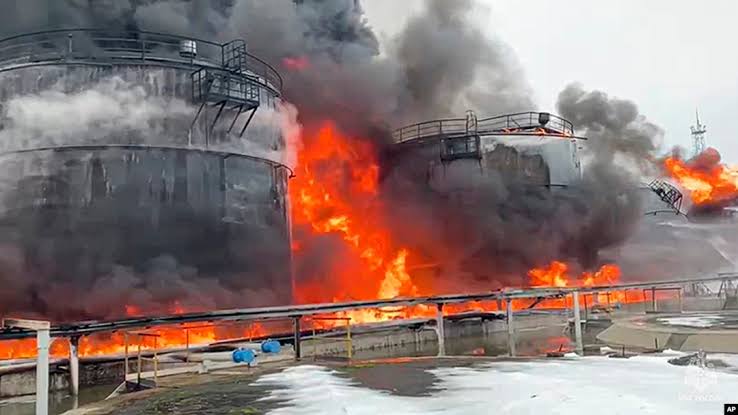Oil rises after Ukrainian attack on Russian depot.

Drone attack in export hub Novorossiysk fuels supply worries
Beijing/Singapore — Oil prices jumped about 2% on Friday on supply fears after a Ukrainian drone attack hit an oil depot in the Russian Black Sea port of Novorossiysk, a major export hub.
Brent crude futures rose $1.24, or 1.97%, to $64.25 a barrel by 3.15am GMT, while U.S. West Texas Intermediate (WTI) crude rose $1.25, or 2.13%, to $59.94 a barrel.
The attack early on Friday damaged a ship in port, apartment buildings and an oil depot in the Russian Black Sea port of Novorossiysk, injuring three crew members of the vessel, Russian officials said.
“Ukrainian drone attacks on the port of Novorossiysk have sparked new fears of oil supply flow disruptions as this port is the second largest oil export hub in Russia and comes on the heels of another major attack at Tuapse barely two weeks ago,” said June Goh, senior oil market analyst for Sparta Commodities.
“The extent of the damage is not yet known, but if the pattern of escalation continues, then there would be a supply curtailment both in crude and product exports out of Russia.”
The gains came after both Brent and WTI fell about 3% on Wednesday, weighed down by a report from oil cartel Opec saying global oil supply will match demand in 2026, marking a further shift from its earlier projections of a supply deficit.
For this week, Brent has gained 0.94% and WTI 0.28%.
The US Energy Information Administration (EIA) on Thursday reported a larger-than-expected rise in US crude stocks last week, while gasoline and distillate inventories fell less than expected.
Crude inventories rose by 6.4-million barrels to 427.6-million barrels in the week ended on November 7, the EIA said, compared with expectations in a Reuters poll for a gain of 1.96-million barrels.
Investors are also watching the impact of Western sanctions on Russian oil supply and trade flows.
The US imposed sanctions on Russian oil companies Lukoil and Rosneft as part of efforts to bring the Kremlin to peace talks over Ukraine. The sanctions prohibit transactions with the Russian companies after November 21.
Around 1.4-million barrels a day of Russian oil, or almost a third of the country’s seaborne exporting potential, has been added to stocks held on tankers as unloading slows due to U.S. sanctions against Rosneft and Lukoil, JPMorgan said on Thursday.
The bank also said after the cut-off date of November 21 for receiving oil supplied by the sanctioned companies, unloading cargoes could become significantly more challenging



0 Comments